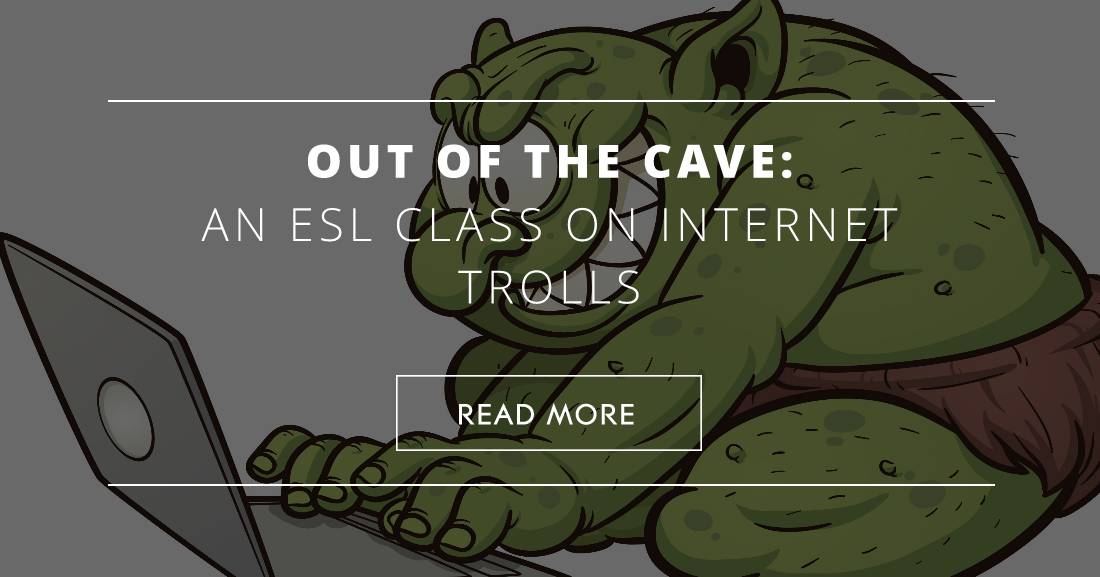The Echo Chamber: An ESL Lesson on 21st Century News Media


It’s fast-paced fun, and more importantly from the teacher’s perspective, it elicits and uses lots of vocabulary in a bid to avoid saying the target word and five other related words. I think I’ve played it a hundred times with different levels of students, and it actually taught me an important skill: how to describe something without giving away the word itself.
This is exactly how I began our class on Internet trolls. I suspected that my students knew the word already, so I elicited it using four ‘hooks’:
My students instantly recognized one or more of these hints, and we soon found that ‘trolling’ has become an internationally accepted word for this behavior. Eliciting the words in my students’ first language revealed some interesting metaphors; the Chinese expression for an Internet troll is a ‘White Eye’, someone with no pupils in their eyes who is therefore oblivious to the sensitivities of others.
All sixteen of my students had an opinion on online trolling, or had experienced it in person or vicariously. With such a strong knowledge base, I knew we were in for a robust discussion, but I wanted to establish a platform of vocabulary which would enhance the debate and add lots of detail. I taught, checked or reviewed these words:
Troll, Anonymity, Chat room, Newsgroup, Comments thread/section, In-jokes, LOL/Lulz,
Frustration, Disgust, Offense, Outrage, Fake(ry), Indifference, Morality, Racism
Ad Hominem attacks/insults
I then elicited the most common actions of trolls using the question-answer dialogue format I so often favor during this section of classes:
| Teacher: | We can imagine this troll, right? Is he a boy or a girl? |
| Students: | Boy! / Probably boy / Maybe is boy |
| Teacher: | And how old is he, approximately? |
| Student 1: | Maybe teenager? |
| Student 2: | Young, maybe still at college. Or just graduated. |
| Teacher: | And this is a sensitive question, but… what race might he be? |
| Students: | White! / Like you, teacher [Laughter] |
| Teacher: | OK, I think a lot of people would agree so far. But, what does a troll want? After all, he’s spending a lot of time on his hobby. Why? |
| Student 3: | He wants to upset other people. To make them feel worst. |
| Student 4: | To offend people. Insulting and offending. |
| Teacher: | [Puzzled face] Why would someone want to do that? |
| Student 1: | The lulz! [Laughter] |
| Teacher: | Right! Say more about that… [Encouraging hand gesture] |
| Student 1: | Is funny, yeah? To make other people feel bad. He thinks is funny. |
| Student 2: | He is laughing when they are crying. |
| Teacher: | So, trolls enjoy making people upset. What kind of people? |
| Student 5: | Maybe gay people? |
| Teacher: | I think that’s quite common. Who else? |
| Student 2: | Women too. Is very common. Very insulting. Like Hillary? |
| Teacher: | Yes, absolutely. Anyone else? |
| Student 6: | I read an article about a troll who insulted a dead woman. |
| Students: | [Mutterings of familiarity, and groans of disgust] |
| Teacher: | This is what I’m talking about. Why would anyone do that? |
| Student 2: | Maybe he is sick. Like, crazy in his mind. |
I dispatched my students to the furthest reaches of the Internet in search of the best troll examples they could find. As usual, they did not disappoint; within ten minutes, we’d gathered examples of the awful ‘RIP Trolls’ mentioned in our dialogue above, as well as Twitter trolls who stalk celebrities, someone who orchestrated a vicious online campaign against a Muslim activist, and another troll who targeted a feminist chat room. This requires quick reading and judicious selection of source material, two themes of our research sessions.
We organized our findings into categories:
We examined some of these messages, postings and tweets to see if there were common themes. Here’s what we found:
I wanted to go beyond my students’ affirmation that trolls are seeking only ‘Lulz’ and try to establish the average troll’s state of mind and intentions. My students agreed that trolls were likely to remain part of our online discussions, and would probably become more sophisticated and dangerous as they gained new skills and tools. As such, we felt the need to carry out an amateur psychoanalysis of an everyday troll, and we teased out these explanations for his behavior. Important vocabulary is included in bold:
My students got together in groups for about ten minutes to brainstorm answers to this question. During these discussions, I usually keep out of the way and simply monitor what’s going on; this probably isn’t the time for a lot of corrections, but if I hear the target language or structures going astray, I’ll briefly step in with a quiet hint.
I then asked for feedback, rotating between the groups until we’d filled the board with ideas:
| Teacher: | This is what I want to understand: why troll the family of a dead soldier, or a murdered teenager? |
| Student 5: | I think it’s like this… Maybe the troll is criticizing people for caring about things. They care too much, he says. They have too many feelings and get too upset. |
| Teacher: | Wow. So, his point is that we shouldn’t care about each other? |
| Student 5: | Yes, and that people who care or who love or who, you know, they’re not safe… they’re … what word, when it’s easy to hurt you? |
| Teacher: | [Open gesture to the class]. Who’s got this one? |
| Student 3: | Vulnerable? |
| Student 5: | [Claps hands] Yes, vulnerable. |
| Teacher: | [Big thumbs up to student 3] |
| Student 5: | Is easy to insult a vulnerable person. Like a criticism that they became vulnerable. Is their fault, maybe, that they’re not stronger. The troll is just like a bully in a school. He sees it’s easy to make you cry, so he does it every day. |
In his excellent research piece on this topic, Richard Seymour characterizes a troll’s view like this: “Caring too much about anything is a fault deserving of punishment.”
This became a vigorous and fascinating policy discussion. My students had a range of views on how we should respond to those who seek only to harm and offend others, and to degrade our trust in our institutions and leaders. Most of them recommended tougher responses by Internet Service Providers and by the government; they applauded a new British law which specifically addresses the problem; they recommended that we follow the existing advice: ‘Don’t Feed The Trolls’; and finally, they cited the importance of education, both in the morality of personal discussion and how best to use the Internet and avoid trolls.
It was seen in exactly the same way as physical bullying, with which trolling shares many characteristics: it’s done mostly by males, for their own enjoyment at that of their cohort, and it takes aim at the vulnerable, those who cant defend themselves, and those who have publicly emoted on a topic of importance to them, and it is treated as little more than a game by its perpetrators. My students looked forward to a time when humans no longer derived enjoyment from harming each other, a hope that I made a point of applauding.
Understanding this phenomenon and crafting a response created huge opportunities for language practice, and I’ve never heard my students produce the target language as consistently as they did during these discussions. By raising awareness of trolling and its dangers, we can begin to address this debilitating and frustrating game, and to see its players as childish, selfish, inhumane and misguided. At the same time, we learned a great deal about the format and style of Internet discussion, and found that we agreed on the importance of elevating those conversations, and creating a vigorous but civil discourse in online communities.